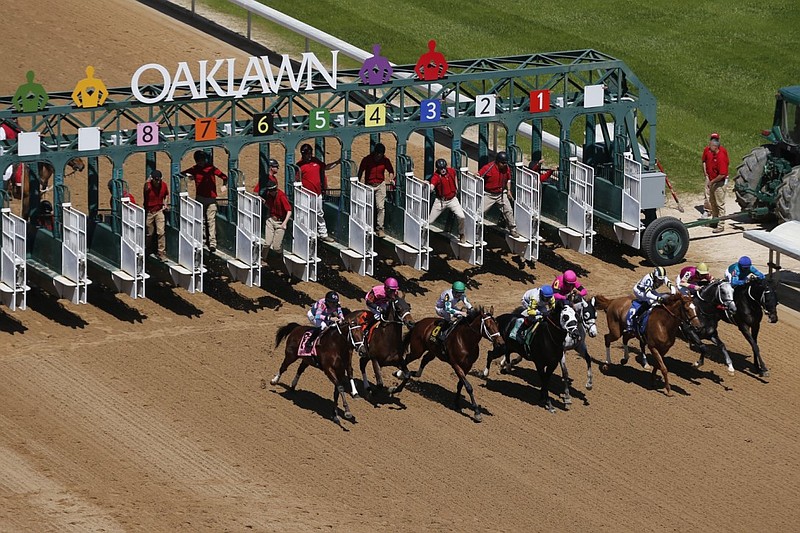Despite differing opinions on its constitutionality, the present members of the Arkansas State Racing Commission voted unanimously Wednesday to enter into a Voluntary Implementation Agreement with the Horseracing Integrity and Safety Authority.
The program, known as HISA, is the U.S. government's implementation of doping regulations with a centralized testing process, put into place as an answer to a rash of race horse deaths over the last few years.
It's expected to be signed off on by the Federal Trade Commission on March 27. That's after it initially declined to approve of the program in December.
A Fifth Circuit Court had ruled it was unconstitutional, saying the FTC was not given enough authority over the program.
In late December, Congress amended language in an omnibus spending bill to satisfy the ruling.
Earlier this month, the Sixth Circuit Court ruled the amended language was constitutional.
The Voluntary Implementation Agreement means a track such as Oaklawn in Hot Springs would observe HISA's guidelines without direct HISA supervision.
Only six of the seven racing commissioners were present for the meeting and vote held by phone.
Bo Hunter of Fort Smith was the absent member.
During the 20-minute meeting, Walter Skip Ebel, the general counsel for Oaklawn Jockey Club, detailed where things stood for HISA and what Oaklawn stood to gain and lose from entering the agreement.
"I think what we're seeing as the inevitable is here," Ebel said. "I don't think anybody has been a big fan of it, but it is what it is. And so we've got to go ahead and sign up and get the voluntary implementation going. And just go along with it. See what happens."
Ebel said Oaklawn had already "been kind of operating under the HISA safety rules" ahead of the vote.
"If we don't sign up for the Voluntary Implementation Agreement, then HISA will be in here beginning March 27, with their own people, doing all the testing and handling all the things that we've previously been doing," Ebel said. "They'll probably be sending us a bill for their extra costs of doing so."
Ebel said the agreement stated the commission could opt out of it with 120-days notice.
The main issue that appeared to result in the commission's unanimous vote: money.
HISA would not regulate a state if simulcast signals of events were not transmitted out of the state, something Ebel noted that states like Texas and Idaho have elected not to do.
"The [Oaklawn] Horsemen and Oaklawn looked at that and that would be devastating to the purses," Ebel confirmed when asked about it by a commissioner. "Our signal sells very well and it's very good for us."
Ebel said the "other downside" to not signing the agreement would be losing out on "proposed credits from the HISA fee."
According to Ebel, HISA has readjusted its assessment for Arkansas, which is being paid by Oaklawn and the Horsemen.
"The fee that we're paying right now on a monthly basis is $2,065,000 pro-rated over the 12-month period," Ebel said. "And if we sign the agreement, we are eligible for up to $310,000 of credits. There's $190,000 credit for the race day testing and there's $120,000 credit for out-of-competition testing. There's also a reimbursement that HISA will do for the racing commission, investigative staff costs and expenses which you may incur on doing investigations."
Jeanette Milligan, executive director of the Arkansas HBPA, said the organization still believes that HISA as it stands is still unconstitutional.
"The Fifth Circuit, they kicked it back to district court," Milligan said. "When they get it back, it's going back to the same three judges. So we still feel like they'll still rule it unconstitutional under those grounds."
The most vocal among the commissioners about HISA's constitutionality was Alex Lieblong of Conway.
"I think most of us think it is unconstitutional, but that doesn't mean it's so," said Lieblong, who owns an investment firm in Little Rock and has been in horse racing since the early 1990s. "I hope it all gets thrown out. I hope we can be done with them within six months, but I doubt it. I've watched them do so many things unconstitutional over the years ... and it hasn't stopped."
Lieblong later expounded on his feeling when reached by phone.
Lieblong, who is concerned about oversight, acknowledged that HISA was implemented with "good intentions," but "it was basically crammed down everybody's throats."
However, he conceded that "the simulcast system is too important to our purses to do without."
Steve Landers, another racing commissioner, called the situation a "Catch-22" when reach by phone.
"The rules are coming down," said Landers, who ran for the Little Rock mayor's office last year. "We got to implement the rules or opt out. You would lose money for the owners. We want safety for the horses for sure. And we want the riders to be safe and we want the public to be safe from anything.
"They've been telling us for a while it's going to come in and it's here, so we just got to get in tune with it as a group with Oaklawn."

